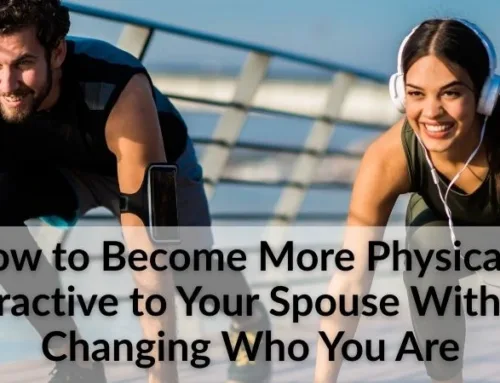Don’t have your headphones or a private place to listen right now? Read the script here:
A Conversation With Dr. Joe Beam & Amber Nickle
Dr. Beam: Marriages in and of themselves have some degree of stress. Learning how to live with another person and figuring out how to do life together. But, sometimes it’s even more difficult because other stresses are added. Maybe a child gets sick, or one of your parents gets sick and you are called on to help him or her. Or even your spouse himself or herself gets sick. All kinds of things can exist out there that creates a special need for someone, and then that begins to have an impact and make your marriage even more stressful than it was.
Well, how do you deal with that? I have a person here that knows how to deal with that because she has, and is, dealing with that. This is Amber Nickle. Amber is one of our Client Representatives at Marriage Helper. Amber, can you tell a little bit of your story about how you dealt with the child, and are dealing with a child with a special need.
Amber Nickle: Absolutely. So our son was born six years ago. He was our firstborn. And shortly after his birth we found out that he was diagnosed with a liver syndrome. And we were not prepared for that. We thought we had a perfectly healthy, colicky baby boy. And that really was the furthest thing from the truth. And we thought we were equipped for all the things that came with parenthood, the lack of sleep, and all the changes that come with it. But we just were not equipped for his needs and all the responsibilities. And even the burdens, the external burdens and forces that kind of played into really navigating [Wyatt 00:01:28]’s care.
Dr. Beam: Okay. Now I heard you mention that he had this… You have a word for it… a syndrome where he would sleep during that day and-
Amber Nickle: Oh yes. So he… Some of the things that were kind of displayed in addition to the specific liver disease, is that he had something called Sundowners. A lot of elderly people, specifically in living… assisted living homes, they will experience that. And so it wasn’t that his schedule was just a little off because he was a newborn, but his nights and days were completely flopped and switched.
And so it was things like that that we just didn’t know how to navigate. The doctors could tell us what to expect, you know, long term, of what the general care for him would be, and protocol would be for his syndrome, but in the day-to-day, we felt completely inadequate as parents in really taking care of this little boy. Because at the end of the day, it was on our shoulders like any other parent.
Dr. Beam: So how did that affect the relationship? You see, we know statistically speaking, that for many marriages the birth of a first child becomes the first major problem because now it’s, “Well, we don’t have all the time for each other we used to have. This child’s now absorbing some of that.” And it can be a difficult thing just to adjust to that first child.
But now a first child with these special needs, how did it affect you and your husband?
Amber Nickle:The biggest issues for us were we thought we had good coping mechanisms, not perfect, but we had truly never faced any real outside issues or anything that was completely out of our control that we hadn’t contributed to. And so communication, of course we had had disagreements before, but we had always worked through them.
But there was an issue with managing expectations, for myself as a spouse and a mom, but also looking to my husband and saying, “What are you going to do about this?”, and vice versa. And there became a lot of division, and at the end of the day it just led to resentment.
Dr. Beam:On your part? His part?
Amber Nickle:Both parts.
Dr. Beam:Both parts.
Amber Nickle:For different reasons, but resentment would be the key word for what happened in that year.
Dr. Beam:We know that when people have expectations, and we almost always have expectations about various parts of life. When those expectations are not met, we feel pain. It hurts us. And that pain can often turn to anger.
And now that you have two parents, you had the dad, you had the mom, each one of them having expectations, “What’s it going to be like to have this first child? And he’s a boy and all these things are going to occur.” And when those expectations now are not being met in the sense that, “We did not expect our child to be sick. We did not expect our child to have this much need,” and having to give those needs. And of course, even the finances. All kinds of things involved there.
But what is interesting Amber, is that people tend to deal with those hurts, those pains, in different ways, which sometimes actually splits them up because it’s, “Why aren’t you feeling what I’m feeling?”, or, “Thinking what I’m thinking.” Did you guys have any of that going?
Amber Nickle:All of that. So I was very much pursuing my husband, going to him, opening up to him saying, “This is how I’m feeling,” frustrated, whatever it was. And my husband would do a very good job of listening. But in terms of how he would communicate back to me, “I’m here for you. I hear you. I’m on your side.” In his defense he really thought he was, but in a way I still wasn’t hearing it for what it was.
Dr. Beam:Okay. Because he came at it from a different set of understandings and emotions.
Amber Nickle:Different set of understanding. And of course, he was navigating his pains and his hurts and his brokenness about it. And grief, really. And so that was really kind of what kind of broke… you know the straw that broke the camel’s back in terms of all of that, was the communication and trying to understand each other. It just was not happening.
Dr. Beam: So rather than being pulled together over this need-
Amber Nickle: We were-
Dr. Beam:… this child that you both loved…
Amber Nickle:We were ripped apart.
Dr. Beam:Ripped apart. Which ultimately led to what?
Amber Nickle:It eventually led to my husband having an affair. My son did not cause my husband’s affair, but it was the perfect storm. My husband, in a way, I think was feeling inadequate because he really was trying to hold up the family, be the provider, lead us through this situation, but I kept basically saying, “This isn’t enough. You’re not enough. You’re not doing enough. Fix it.” And when you hear that so many times, it’s, “Okay. I’m not doing enough,” and so he just shut down.
Dr. Beam:Which is not an uncommon occurrence-
Amber Nickle:No.
Dr. Beam:… when people like every, “I don’t know what else to do. I’m doing all that I can. And I can not do this,” that sometimes the way we do that is just to a degree dissociate ourselves from it.
Amber Nickle: Absolutely.
Dr. Beam: Right? And somebody’s comes along who seems to be a solution.
Amber Nickle: Yeah, and understanding. And kind-
Dr. Beam: Ah, “I hear you-”
Amber Nickle: … and respectful.
Dr. Beam: “… and I understand you. I’m on your side,” those kinds of things. And all of us, I don’t care how strong an individual is, we all love that. When somebody just seems to be the person that can just be, “I’ll take care of you,” in whatever fashion it might be. “I’ll listen to you.” Whatever it means.
And so that happened. But… but you guys were able to pull it back together.
Amber Nickle: Yes. We eventually did pull it back together after going to the workshop. We were separated for a year and going through the divorce process, but we eventually came back together and he’s been home for several years now.
Dr. Beam: Mm-hmm (affirmative). The workshop that Amber’s referring to is the workshop that we do through Marriage Helper. It’s an intensive three day workshop. We do them very often. We do a ton of them every year. And couples come from all over America and Canada, and literally all over the world, who come to that workshop. And for three days we work together in this intense marriage workshop.
We don’t preach at people. We don’t try to make people stay married. We don’t try to control anybody. We make it very comfortable for both spouses to be there, including the one that doesn’t really know if he or she wants the marriage to work. And in that three day workshop help them figure some things out, which works out pretty well, because ultimately three out of four couples decide to stay together after that.
Amber Nickle: Absolutely.
Dr. Beam: So when you came to the workshop, I was already prepared not to like [John Lewis 00:07:35] because I felt, “Okay, you’ve got this child and you’re leaving your wife and your child.” And I was mad about that, even though I’d never met him. Which is judgemental on my part, I shouldn’t think like that. But within 20 seconds of the time meeting him, I wound up liking him and I was thinking, “Dang, I like this guy. He’s really a good guy,” because good people sometimes do these things. Not just bad people, good people.
Amber Nickle: Absolutely. And my husband, as skewed as it may have been at the time, he really thought he was doing something good for his children. He would disassociate the affair part, but he would say, “Our kids,” because at the time we had a three-month-old and a one-year-old, when my husband left, and he would say, “Our children deserve to be happy. Our children deserve to grow up in a healthy, happy home. And if it ends up that it just needs to be two homes, that’s better than them being in one home where there’s constant division, constant arguing.” And he goes, “And that’s not healthy.”
So he really, truly thought that he was offering something to them, that they potentially weren’t going to have if we kept going the way we were going.
Dr. Beam: How do you feel about that now?
Amber Nickle: He of course looks back and shakes his head. He still remembers thinking that way and feeling that way, but he also understands that as much as I had a role to play in this, that he realizes his weaknesses.
But he’s also changed that. And there’s also grace in all of that, because we do communicate very differently. We process very differently. And it’s not that we get it right all the time, but we do now have an ability and an understanding to go, “You know what? It’s okay that we don’t see eye to eye on this.” But at the end of the day, we know, “Hey, I’m on your team and you’re on mine.”
Dr. Beam: Okay. So Wyatt still has special needs.
Amber Nickle: Absolutely.
Dr. Beam: So how do you deal with it now differently than back then?
Amber Nickle: Well back then, and even now, I’m very much the type of person who wants to be involved in the process. I am not a medical professional, but at the end of the day I’m still mom and momma knows what’s best for her baby.
And my husband’s background is working in a hospital, and a lot of the doctors that were caring for our son are still caring for our son, those are his colleagues. And before he would get embarrassed because I would say something or I would question something, and he didn’t… those are the people he worked with, he respects. But now he really looks at it and goes, “You know what? That’s how Amber is.” And by allowing me to be me, respectful, but to be me, I have a peace and security because I feel like, “Okay. I’m a part of the process.”
Dr. Beam: Good.
Amber Nickle: I felt very much like I couldn’t do anything, because he would want me to hold back. And now he really allows me to honor that. But also when he isn’t getting very involved or not saying a lot, I’m not looking at him going, “Why are you just sitting there? Why are you not being proactive?” I realize that’s not his comfort level, and that’s okay.
Dr. Beam: Okay. So if we start putting this together for people saying, “Okay, tell me the practicals end. Tie this together. What do we do?” What I just heard you say was one part of it is learning to accept that we are different people, we’ll think differently about this, but we can accept that and not resent that we’re coming at it differently. That’s part of it?
Amber Nickle: Absolutely. And a lot of people sometimes feel like they’re waving the white flag if they say, “I accept how you feel.” And it doesn’t mean that you, again, agree on everything, but everybody’s entitled to their own feelings and their own processes. And so just saying, “Look, I don’t fully understand how this working for you, but I want you to know that I am on your side and I’m willing to work through this with you,” that would have been a game-changer back then. And it still is now.
Dr. Beam: Okay. So being a team, working together, even though you don’t feel things exactly the same way, or process things the exact same way, you figured out teamwork.
But what about time together? I mean every couple needs that, and you still have a special needs child, so how do you handle that?
Amber Nickle: Absolutely. So our thing is at the end of the day, after we eventually get the kids in bed, the first 30 minutes we just sit there and we just talk. And it’s not that there’s a certain expectation of we’re going to handle business affairs, if anything that’s really the last thing we want to discuss. But it’s just the weather, the workday, whatever it may be… goals. Goals especially for us of… even if it’s a vacation, or a quick trip with the kids, or whatever’s going on that weekend, it just kind of realigns us to say, “Hey, we’re in this together.”
Dr. Beam: Ah, and so you spend time with each other. So if we were to wrap this up and say, “Okay, if you have a special needs child,” for example, or any other, because it can be something else.
Just the night before we videoed this, I received a message from a guy who said my wife has left me because she said that I haven’t been there for her, and I tried to explain to her, “Well my dad’s been going through Alzheimer’s and then he died,” and the way I survived all of that because I was close to my father, is that I just shut down and was not feeling anything and that’s how I coped.
To which she replied, “Yes, but you shut down against me too. And I still had needs as your wife. I needed you to be there for me emotionally. I needed us to respond. And so while I understand your explanation, it doesn’t change how I feel. I feel that I have been abandoned.”
All right? So it doesn’t necessarily then have to be just a child. It can be a parent, whatever else, all right? So we’re summarizing this. We’ve said, “Try to figure out how to be team-”
Amber Nickle: Yes.
Dr. Beam:… “even when you don’t perceive things exactly the same way. Make time for each other where if nothing else you just talk about the weather.”
Amber Nickle: Yeah.
Dr. Beam: What else?
Amber Nickle: I would also go back to being a team. That may require you initiating that. A lot of people expect the process to be, “We’re going to walk hand in hand. We’re going to walk into the sunset and do this together.” And that can and does need to eventually happen, but it’s probably going to require more effort on your part. And some people say it’s not fair, but I always say, “Do you want to be right or do you want to be married?” I would rather be married and take the initiative, because what you gain in return is it’s going to minimize anything that’s been dealt with in the past.
Dr. Beam:And that’s a very good point Amber. I like that.
Okay, I may think that the other person should do it, or we do it equally because that’s what’s fair. But what you’re saying is, “Get what you need, even if you’re the one that has to start it, initiate it, make it happen because that’s what you really want.”
Amber Nickle: Absolutely. Lead the way you would want your spouse to be leading, because potentially you’re going to lead by example and they’re… They can follow suit.
Dr. Beam: Excellent. Very good.
Now if you’d like to know more about this workshop that Amber and her husband came through, our intensive three day workshop, Amber is one of our Client Representatives. We have several. And if you call here, the number you see on the bottom of the screen, you can actually contact us and talk to any of our Client Reps. But if you want to talk to Amber, like, “I think she understands what I’m going through,” then feel free to ask for her. Now understand, she won’t do a hotline kind of thing, or that she’s going to be your counselor and therapist, that kind of thing. But, you can listen.
Amber Nickle: Absolutely.
Dr. Beam: You’ll understand.
Amber Nickle: Absolutely.
Dr. Beam: And guide them to whatever resource we have that’s best for them.
Amber Nickle: Absolutely. And there’s so many things that a lot of people don’t realize that we have, videos, articles and other materials. So even if you’re not sure, even if you don’t know what Marriage Helper has to offer, just call in because we can really troubleshoot what you’re needing in that moment.
Dr. Beam: Excellent. Well, we’re here to help. We care, and in situations even like this where these other situations are causing stresses on the marriage, it still can be done, whether you can make it a good marriage, even though those stresses. And we hope that Wyatt lives to be an old, old man some day.
Amber Nickle: I’m sure he will be.
Dr. Beam: Okay. And he’ll still have some medical needs along the way, but you guys have figured out how to deal with that.
Amber Nickle: How to deal with it. It doesn’t mean that the burden and the stress has gone away, but it’s learning how to manage it in a way that’s healthy for both of us, but also Wyatt at the end of the day.
Dr. Beam: That’s awesome.
We want to help, so please contact us by phone or look at our website at Marriage Helper. That’s MarriageHelper.com, or subscribe down below to our YouTube channel and you’ll see all of our new videos so you’ll know about them when they come online. We talk about a lot of things concerning relationship. You see? We care. We really do. And we want to help.
We can help you how to manage the burden and the stress in a way that’s healthy for your marriage. Start by getting the free guide: How To Stop Your Divorce & Get Your Marriage Back In 7 Steps at https://your.marriagehelper.com/rescue/hs/save/optin






